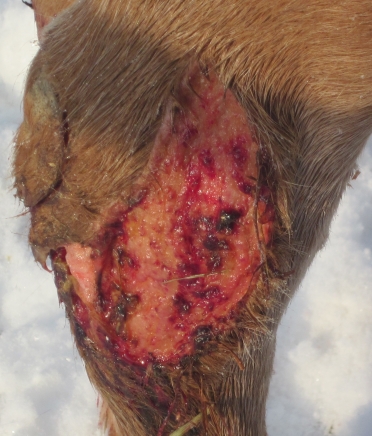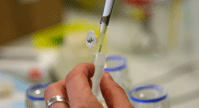Warmblood Fragile Foal Syndrome (WFFS)
Description:
 Warmblood Fragile Foal Syndrome WFFS is an inherited autosomal disorder caused by a single mutation in PLOD1 gene. Mutations in PLOD1 are known to cause a similar disorder in humans known as Ehlers-Danlos Syndrome VI (EDSVI).
Dr. N. Winand discovered the (c.2032G > A) in the PLOD1gene that causes this disorder in certain horse breeds.
Warmblood Fragile Foal Syndrome WFFS is an inherited autosomal disorder caused by a single mutation in PLOD1 gene. Mutations in PLOD1 are known to cause a similar disorder in humans known as Ehlers-Danlos Syndrome VI (EDSVI).
Dr. N. Winand discovered the (c.2032G > A) in the PLOD1gene that causes this disorder in certain horse breeds.
WFFS has been identified in a population of horses known as Warmbloods. Primarily originating in Europe during the Middle Ages, Warmblood horses were the result of breeding large cold blood draft horses of northern Europe with hot blooded, lighter and faster Arabian horses that warriors captured in the Middle East and Africa and brought back with them after their battles. As a result Warmbloods are a group of mid-sized horse types often called Sport Horses and developed with the aim of competing in Olympic equestrian sports.
An affected WFFS foal is born with a two copies of the mutated LHl gene, one coming from each parent. The affected foal will display extreme skin fragility characterized by tearing, ulceration, etc. from contact with normal surroundings. Small skin lesions can occur anywhere on the body, but are most noted on pressure points. In addition to skin wounds, lesions may also be found on the gums and other oral cavity mucous membranes. The Limb joints are lax and hyperextensible. Fetlocks are the most dramatically affected generally preventing a foal from standing normally. Unfortunately there is no cure and all affected foals must be euthanized soon after birth.
The frequency of the mutant LHl gene in Warmbloods appears to be approximately 6.40%.
Unfortunately, there is not a cure of WFFS. As the condition worsens, the foal will begin to develop severe infections, as well as suffer from increasing pain and discomfort. Foals often die from these infections, or are euthanized within 3-8 days from birth for humane reasons.
WFFS is an autosomal recessive trait, meaning a foal can only be affected if the foal inherits the disease from both parents. Parents that are carriers do not have any symptoms associated with WFFS. However, they will pass on a copy of the defective gene to their offspring 50% of the time. If breeding two carrieres the foal has a 25% chance of being affected and a 50% chance of being a carrier.
Breeds Affected:
Testing for WFFS is valid for Warmblood horses.
Test Results:
Animal Genetics offers DNA testing for Warmblood Fragile Foal Syndrome (WFFS). The genetic test verifies the presence of the recessive WFFS Gene and presents results as one of the following:
Warmblood Fragile Foal Syndrome (WFFS):
| WFFS/WFFS | Affected | The horse carries two copies of the WFFS mutation and is homozygous for WFFS. The horse is affected with the WFFS genetic disorder associated with your breed. |
| N/WFFS | Carrier | Both the normal and mutant alleles were detected. Horse tested heterozygous for WFFS and is a carrier of the WFFS mutation associated with your breed. |
| N/N | Clear | Horse tested negative for WFFS and does not carry the WFFS gene mutation. The horse will not pass on the defective gene to its offspring. |
References:
Monthoux C et al. (2015). Skin malformations in a neonatal foal tested homozygous positive for Warmblood Fragile Foal Syndrome.
Submit a Sample for Testing:
To submit a sample for testing please click on ORDER and download a sample submission form. Then follow the sample collection and submission instructions.
Cost per sample is $40.00. Please see our Equine Fee Schedule for all equine testing rates.










